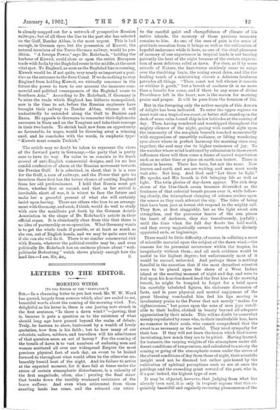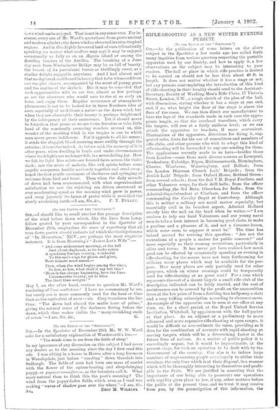LETTERS TO THE EDITOR.
MORNING WINDS.
[TO THE EDITOR OF TILE "SPECTATOR."]
Siu,—In a charming letter to you last week Mr. W. W. Ward has quoted, largely from sources which, alas! are sealed to me, beautiful words about the coming of the morning wind. Yet, delightful as his letter is, there is one jarring note struck in the first sentence, " Is there a dawn wind ? "—jarring, that is, because it puts a question as to the existence of what should long ago have passed beyond the realm of debate. Truly, he hastens to show, buttressed by a wealth of lovely guotation, how firm is his faith ; but to how many of our colonists, sailors, soldiers, and travellers will his admittance of that question seem an act of heresy For the coming of the breath of dawn is to vast numbers of enduring men and women scattered all over our widespread Empire the most precious physical fact of each day, an event to be looked forward to throughout what would often be the otherwise un- bearably humid heat of the night. And its failure to arrive at the expected moment, for it does fail at times under the stress of certain atmospheric disturbances, is a calamity of the first magnitude, often, alas ! proving the final straw that breaks down the terribly weakened resistance of the brave sufferer. And even when retirement from those exacting lands has come, and the released one retire to the easeful quiet and changefulness of climate of his native islands, the memory of those precious moments remains to him. As one of the uses of pain is the sense of gratitude cessation from it brings as well as the cultivation of hopeful endurance while it lasts, so one of the chief pleasures of memory of our experiences in tropical lands is our bearing patiently the heat of the night because of the certain expecta- tion of most delicious relief at dawn. For then, as if by some miracle of Nature, the heat-waves suddenly cease to surge over the throbbing brain, the oozing sweat dries. and like the healing touch of a ministering cherub a delicious freshness pervades all things. Thou canst not tell whence it cometh or whither it goeth," but a breath of coolness (it is no more than a breath) has come, and if there be any sense of divine Providence left in the heart, now is the season for morning praise and prayer. It will be pure from the fountain of life.
But in the foregoing only the nether margin of this Aurora of delight has been indicated. To enter the upper regions we must wait on a tropical sea-coast, or better still, stand upon the deck of some calm-bound ship in low latitudes at the coming of day. Then, having wondered and worshipped throughout the mighty silences of the night, gazing with restful sight upon the immensity of the sea-plain beneath touched momentarily with suggestions of unearthly radiance, or lifting wondering eyes above where in perfect harmony the morning stars sing together, the soul may rise to higher eminences of joy. To the watcher whose mind is attuned by submission to these sweet influences there will then come a frame of sacred expectation such as no other time or place on earth can bestow. There is silence in heaven. There has been, but not the same. Now heaven and earth and sea are waiting, and man must needs wait also. Not long. And God said "Let there be light." He speaks, and His breath is felt bringing life as well as light. The twin glories of day-dawn appear. The rich deep sheen of the blue-black ocean becomes diversified as the freshness of that celestial breath passes over it, while follow- ing closely, the triumphant clanging of colours strikes upon the senses as they rush athwart the sky. The tides of being that have been just at lowest ebb respond to the mighty call. They flow, at first sluggishly, but as the light sweet airs strengthen, and the precursor lances of the sun pierce the heart of darkness, they rise tumultuously, joyfully ; until the time when the full day floods the half-world, and they sweep majestically onward towards their 'divinely appointed ends, or beginnings.
There would be little difficulty, of course, in collating a mass of scientific material upon the subject of the dawn wind,—the reasons for its perennial occurrence within the tropics, its irregularity without them ; and all such evidence would be useful in the highest degree ; but unfortunately most of it would be unread, unheeded. And perhaps there is nothing fanciful in the assertion that if the most dryasdust scientist were to be placed upon the shore of a West Indian island at the meeting moment of night and day, and were to feel upon his heat-burdened head the first kiss of the morning breath, he might be tempted to forget for a brief space his carefully tabulated figures, his elaborate discussion of facts, and in pure physical and mental enjoyment of the great blessing vouchsafed him feel his lips moving in involuntary praise to the Power that not merely " makes for righteousness," but pours upon the sons of men joys unten- able to their bodies, clothed in beauty beyond all adequate appreciation by their minds. This will no doubt be somewhat sternly repudiated by some who, to their incalculable loss, have no romance in their souls, who cannot comprehend that the sweet is as necessary as the useful. They need sympathy for their loss. If they will not learn the lesson which God is eves inculcating, how much they are to be pitied. Having learned, for instance, the varying weights of the atmosphere under dif- ferent conditions of temperature, and calculated to a nicety the coming or going of the atmospheric ocean under the stress of the altered conditions of day from those of night, their scientific insight need not be dimmed but rather quic kened by the cultivation of spiritual perceptions such as are at once the privilege and the exceeding great reward of the poet, who is, if a poet indeed, the highest type of seer.
It may be objected, however, that judging from what has already teen said, it is only in tropical regions that this ex- quisitely beautiful and regularly recurring phenomenon of the
dawn wind can be enjoyed. That is not in any sense true. For in- stance, every one of Mr. Ward's quotations from poets ancient and modern allude to the dawn wind as observed in extra-tropical regions. And in this highly favoured land of ours (climatically speaking, no matter what scoffers may say) it may be enjoyed occasionally as fully as on an .Egean island or among the dazzling beaches of the Antilles. The breaking of a June day seen from Westminster Bridge may be as full of beauty, the breath of its pursuivant breeze as thrillingly sweet, as a similar delight enjoyable anywhere. And I had almost said that no daybreak could excel in beauty that to be witnessed from our sea-girt shores, accompanied by the scent of young grass and the matins of the skylark. But it may be conceded that such opportunities with us are few, almost as few perhaps as are the observers who would care to rise at so early an hour, and enjoy them. Regular recurrence of atmospheric phenomena is not to be looked for in these Northern isles of ours, especially of so delicate a nature as the dawn wind, but when they are observable their beauty is perhaps heightened by the infrequency of their occurrence. Yet it should never be forgotten that prone as we are to un dervalue or take little heed of the constantly recurring wonders around us, this wonder of the morning wind in the tropics is one to which man never grows indifferent. For it appeals to all his senses; it sends the sluggish blood coursing more swiftly through the arteries ; it is nectar indeed. As before said, the memory of it in after years, when dwelling in lands and under circumstances where its delights are no longer felt., is a never-failing joy. How we felt its light kiss salute our fevered faces across the violet dark ; saw the mists of malaria, like evil spirits before some angelic conqueror, huddle noxiously together and steal away ; beard the first gentle movement of the leaves and springing of weleome from bird and beast. Then when the daily miracle of dawn had been consummated, with what superabundant satisfaction we saw the rejoicing sea driven shoreward at ever accelerating speed as the morning wind grew in power, and sung joyously its hymn of praise while it revivified the slowly awakening earth.—I am, Sir, &e., F. T. BVLLEN.







































 Previous page
Previous page